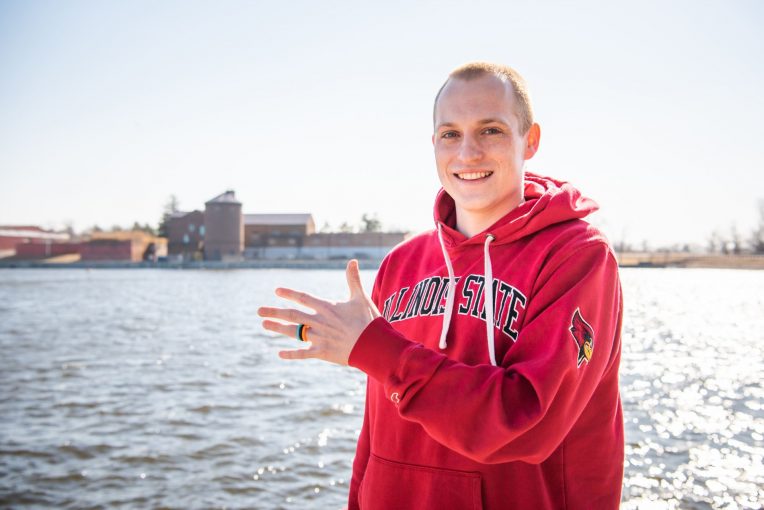Cody Rogers has been using the experience he has obtained from the College of Business’ MBA program to grow a Bloomington-based business that recycles fishing line recovered from waterways across the country.
Blood Knot Ring is the second company that Rogers has helped start, but it has been the most rewarding for him. Since the company’s inception last year, he has worked alongside owner Bobby Vericella ’04 nearly every step of the way.
Hundreds of thousands of marine mammals die each year worldwide from being entangled in fishing line and other debris. Monofilament fishing line poses a large threat to sea life as it is typically thin and clear, making it difficult for animals to spot.
“After we had done some research on this, we just really wanted to help the environment,” said Rogers. “We focus on monofilament fishing line, which is one of the most polluted items in the ocean. We found a way to collect monofilament line from all across the country, recycle it here in Bloomington, and make the rings.”
Blood Knot Ring recycles recovered fishing line and melts it down into monofilament beads. From there, the beads are molded into the rings that they sell.
“If you have a line break, a blood knot is a special knot that you can tie to basically combine the two lines together,” explained Rogers. “So, we incorporate ‘blood knot’ into our rings; that’s how we hold the ring together. We’ve also had people purchase these rings as a replacement for their wedding band, so it’s also taken on a metaphor for marriage.”
Blood Knot Ring obtains recovered fishing line from nonprofit organizations across the United States. Rogers said the line comes from as far as California, Texas, Florida, and Hawaii, and from the nearby Great Lakes.
Blood Knot Ring donates part of its proceeds to eight nonprofit organizations that it partners with. Working to grow the young company, Rogers has learned that many people are more than willing to support the cause.
“It’s overwhelming how much people are actually willing to help out when given the chance,” said Rogers. “I know a lot of what we see in the news nowadays about the environment is so negative, but so many people really care and want to help out however they can.”
Rogers said Blood Knot Ring has found success in its niche market, crediting stellar customer service and genuine passion for sustainability.
“When we first started, we found out that there’s only one other big company that collects line like we do,” said Rogers. “We contacted people that usually send them their line, and they’re sending it to us now. They’ve said that we’re much easier to work with and that we respond well. I think that’s because we’re 100% focused on what we’re doing; we really care about nature and cleaning the environment.”
While working toward his MBA, Rogers has gained hands-on experience while seeing firsthand how a business is built from the ground up. Vericella said Rogers has been an integral component of Blood Knot Ring’s day-to-day operations since the beginning.
“He’s been helping with marketing and research, and he’s communicating with each nonprofit that we’re working with across the country,” Vericella said. “He’s helped to make our marketing materials, as well as fulfill online orders and make spreadsheets.”
Another Redbird, Amanda Gerwick ’19, also became involved with Blood Knot Ring last year. She researched potential retail locations for the rings and pitched the product to stores.
“My biggest success was partnering with Jack Lewis Jewelers in Bloomington,” said Gerwick, a Normal native who studied communication. “I thought it was cool to see two local companies partner together for an awesome cause.”
Gerwick, Rogers, and Vericella all said Illinois State prepared them well for their endeavors.
“A lot of what I studied, I still use often,” said Vericella, who studied construction management and also operates a rental and construction company. “My professors that I had were really able to relate what we learned in class to real-life experiences. They were able to take that, make it important, and teach you why you need to learn it and how you’re going to use it in the real world. I think that’s valuable.”

